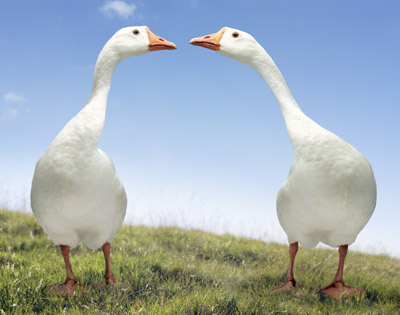Geese are fascinating creatures, but they often raise a lot of questions. Are they classified as animals? Are Canadian geese a nuisance? Can geese be considered farm animals? Let’s dive into everything you need to know about these feathery, honking wonders.

Yes, geese are animals! They belong to the bird class within the animal kingdom. As waterfowl, geese are closely related to ducks and swans, known for their long necks, webbed feet, and migratory behavior. They are part of a larger group called Anatidae. So, rest assured, geese are absolutely animals.
Canadian geese, while majestic, often earn the title of "nuisance animals" in certain contexts. Why?
Overpopulation: In some areas, Canadian geese populations have grown uncontrollably, especially in urban environments where they find plenty of food and few predators.
Property Damage: Geese are notorious for leaving behind droppings—lots of it—which can ruin parks, golf courses, and residential lawns.
Aggression: During nesting season, Canadian geese can become very territorial, chasing away humans or other animals.
Environmental Impact: Overgrazing by large flocks can harm local vegetation, leading to soil erosion.
Some regions implement population control measures or legal guidelines to manage their numbers, such as egg removal or habitat modification.
Geese have been part of farming practices for centuries. Here's how they fit into the agricultural world:
Guardians of the Flock: Geese are known for their loud honking, making them excellent guards against predators like foxes or hawks.
Egg and Meat Production: Certain breeds of geese are raised for their eggs, meat, or fat (such as goose liver pâté).
Weed Control: Geese love grazing on grass, making them natural weeders for crops.
While not as common as chickens or cows, geese still hold a significant place on many small-scale and traditional farms.
Canadian geese (Branta canadensis) are among the most recognizable geese species due to their black heads, white chinstraps, and loud, honking calls. They are migratory birds, flying in iconic V-shaped formations.
Despite being considered nuisances in some areas, Canadian geese play a vital role in their ecosystems, helping disperse seeds and maintain aquatic habitats. Additionally, they are protected under the Migratory Bird Treaty Act in North America, making it illegal to harm them without specific permits.
If you’ve ever been hissed at or chased by a goose, you know they can be intimidating. Geese aren’t naturally aggressive but will defend their nests and young with vigor. It’s best to keep your distance from nesting geese to avoid their wrath. Fun fact: they’re more bark than bite—though their bites can sting!
In cities, Canadian geese thrive due to abundant food sources like lawns and lack of predators. However, their droppings and overgrazing habits cause problems for humans. Cities often employ humane methods to manage geese populations, such as:
Installing decoys of predators.
Using fences around nesting areas.
Applying repellents to grass.
In the U.S. and Canada, geese are protected by wildlife laws, particularly migratory species like Canadian geese. While hunting them is allowed in specific seasons, harming or disturbing their nests outside of these guidelines is illegal.
Geese are vital to their habitats. They help maintain aquatic vegetation, spread seeds, and even provide food for predators. While their overpopulation can lead to issues, their role in balancing ecosystems shouldn’t be underestimated.
Domesticated geese breeds, like Embden or Toulouse geese, are valued for their:
Delicious meat and rich eggs.
Protective nature, keeping smaller farm animals safe.
Ability to thrive on minimal maintenance compared to other livestock.
Geese, whether wild or domestic, are an integral part of the natural world and human agriculture. Canadian geese, in particular, may have their issues, but they remain a vital species worth protecting. Whether you see geese as pests or farm companions, it’s clear they hold a special place in ecosystems and our lives.
Next time you see a gaggle of geese, you’ll know there’s more to them than honking and waddling—they’re essential, complex animals with a fascinating history!
animal tags: Geese
We created this article in conjunction with AI technology, then made sure it was fact-checked and edited by a Animals Top editor.